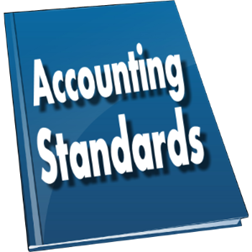In this blog post, Pragalbhi Joshi, who is presently an Associate Editor at International Journal of Advanced Research in Law and Social Sciences and Libertatem Magazine and is currently pursuing a Diploma in Entrepreneurship Administration and Business Laws from NUJS, Kolkata, writes about the applicability of Indian Accounting Standards on companies.
The Ministry of Corporate Affairs has notified Rules for Indian Accounting Standards and also provided a phase-wise roadmap with which, the Indian Accounting Standards shall converge with IFRS. Due to this, India is on a higher pedestal when it comes to financial reporting. The MCA has issued a notification dated 16 February, 2015 announcing the Companies (Indian Accounting Standards) Rules, 2015 for applicability of Indian Accounting Standard (Ind AS). The applicability of this Indian Accounting Standard is based on the listing status and the net worth of the company. All companies, except for Banking companies, Insurance Companies, NBFCs and those listed on SME exchanges. However, the companies should have a net worth of Rs. 250 crore or more.
The Classes of Companies that need to comply with Ind AS have been specified in the Rule 4 of the Companies (Indian Accounting Standards) Rules, 2015 in order to prepare their financial statement and about auditors of such companies while they prepare their audit report. Section 2(40) of the Companies Act, 2013 gives the definition of “Financial Statements”.[1]The Ministry of Corporate Affairs has notified Rules for Indian Accounting Standards and also provided a phase-wise road map with which, the Indian Accounting Standards shall converge with IFRS. Due to this, India is on a higher pedestal when it comes to financial reporting. The MCA has issued a notification dated 16 February, 2015 announcing the Companies (Indian Accounting Standards) Rules, 2015 for applicability of Indian Accounting Standard (Ind AS). The applicability of this Indian Accounting Standard is based on the listing status and the net worth of the company. All companies, except for Banking companies, Insurance Companies, NBFCs and those listed on SME exchanges. However, the companies should have a net worth of Rs. 250 crore or more.
Phase I: Obligation to comply with Indian Accounting Standard from 1st April, 2016
According to Rule 4(1)(ii) of the Companies (Indian Accounting Standards) Rules, 2015 the companies mentioned below have to follow Ind AS from April, 2016:
(a) Companies which are listed in India or in the process of listing on Stock Exchange in India or outside it and have met the net worth of Rs. 500 crore or more.
(b) Unlisted Companies that have a net worth of more than 500 crores.
(c) Parent, subsidiary, joint venture or an associate company of the above.
To put it in other words, this Ind As shall at first be applied to all companies (Listed or Unlisted) which have a net worth of Rs. 500 crore or more in which the accounting period begins on or after 1st April, 2016. The companies meeting the above said threshold for the first time as on 31st March, 2017 shall apply for the financial year 2017-18.1.
Phase II: Compliance of Ind As from 1st April, 2017
In accordance with Rule 4(1)(iii) of the Companies (Indian Accounting Standards) Rules, 2015, the following companies need to comply with the Accounting Standards which begin on or after 1st April, 2017:
(a) Companies that are listed or in the process of getting listed on any of the Stock Exchange in India or abroad and has a net worth less than Rs. 500 crore;
(b) Unlisted companies having net worth more than 250 crores but less than 500 crores.
(c) Any subsidiary, holding, associate or joint venture of the above.
Thus, from April, 2017, the Indian Accounting Standard shall be applicable to all the listed companies, whereas there is a limit on the unlisted companies. The companies meeting the above threshold on 31st March, 2018 shall apply the Ind As from the financial year of 2018-19 onwards. An important point to note here is that comparative figures for the preceding years is required in both the phases ending on 31st March 2016/2017 or thereafter.
No net worth criteria is mentioned for holding, subsidiary, joint venture or associate companies and so, the smaller companies can also be covered in this category to apply Ind AS. Section 2(57) defines “net worth” as the principle shall apply if:
(a) Net worth be calculated according to:
- the stand-alone financial statements of the company as on 31st March, 2014; or
- first audited financial statements which end after 31st March,2014;
(b) for companies falling under any of the thresholds given in Phase I and above for the first time after 31st March,2014, the net worth shall be calculated on the basis of first audited financial statements ending after the date in respect of which it meets thresholds.
Companies where rule for application of Ind AS is not applicable
The following companies need not prepare the financial statements according to the Ind AS:
- i) Banking, Non-Banking Companies and Insurance Companies.
- ii) If the securities of a company is listed or in the process of being listed on the SME Exchange. It is defined in Chapter XB of the Securities and Exchange Board of India (Issue of Capital and Disclosure Requirements) Regulations, 2009.[2]
iii) Overseas subsidiaries, associates, joint ventures of an Indian company are not required to prepare its stand-alone financial statements as per the Ind AS. They are required to prepare such stand-alone financial statements according to the requirements of the jurisdiction. However, since the parent company has to report and prepare the Ind AS accounts, so, even they will have to prepare it.
If a company starts following Indian Accounting Standards for specific criteria, then, it shall have to follow this Standard for all the financial statements made subsequently. It is not limited by the fact if any of the criteria given in the rule does not apply to the said company. However, the companies that are not required to follow the Ind AS shall have to comply with the Accounting Standards given in Companies (Accounting Standards) Rules, 2006.[3]
Footnotes
[1] http://taxguru.in/company-law/mca-notifies-roadmap-applicability-indian-accounting-standards-ind.html
[2] https://notes.aubsp.com/accounts/mandatory-compliance-of-ind-as/
[3] http://www.mca.gov.in/Ministry/pdf/Notification_20022015.pdf
 Serato DJ Crack 2025Serato DJ PRO Crack
Serato DJ Crack 2025Serato DJ PRO Crack











 Allow notifications
Allow notifications


